Today, hospital purchases represent €25 billion a year (drugs, medical equipment, etc.). . Central purchasing agencies play a crucial role in optimizing costs and guaranteeing the quality of supplies. Their function enables hospitals to focus on care while ensuring efficient management of resources.
This article describes the roles, benefits and workings of central purchasing bodies, with a particular focus on UniHA and RESAH.

1. What is a central purchasing unit?
A central purchasing unit is an organization that pools purchases for several establishments.
Here is theINSEE definition:
A central purchasing group is a structure that manages the purchases of its affiliates, which may be retailers or wholesalers:
- product review
- supplier search
- purchasing negotiation
- in some cases, dispatch, organization and documentation activities.
These services are reserved for the exclusive use of central members, to whom they are bound by contract.
In the hospital sector, the central purchasing office centralizes orders to obtain more advantageous purchasing conditions than if they were placed through a single method.
2. How does a hospital purchasing group work?
A central purchasing group is managed by a consortium. It studies the market, products and suppliers in order to buy at the best price for redistribution to its network. With this model, franchisees can focus their resources on patient satisfaction and operations, safe in the knowledge that their supplies are well organized.
3. Advantages of central purchasing for university hospitals and hospitals
Economies of scale for hospitals
Central purchasing groups enable hospitals to benefit from lower prices thanks to bulk purchasing. By pooling orders from several establishments, they can negotiate more advantageous rates with suppliers.
For example, purchasing medical consumables in bulk reduces unit costs, resulting in significant savings for hospitals.
Quality and safety for hospitals
Purchasing groups carry out a rigorous selection of suppliers and products to ensure compliance with safety and quality standards. They evaluate suppliers according to strict criteria, including product quality, delivery reliability and regulatory compliance.
For example, RESAH has implemented a supplier certification process to ensure that only products meeting the highest standards are purchased. This minimizes the risk of incidents linked to poor-quality products and ensures patient safety.
Administrative efficiency for hospitals
Centralized purchasing considerably simplifies administrative and inventory management processes for hospitals. By delegating purchasing management to a central purchasing office, facilities can reduce the number of contracts they need to manage, and minimize the administrative tasks associated with ordering and receiving.
UniHA, for example, uses a purchasing management system that tracks orders and inventory in real time. This reduces administrative work and improves operational efficiency.
Innovation and technology for hospitals
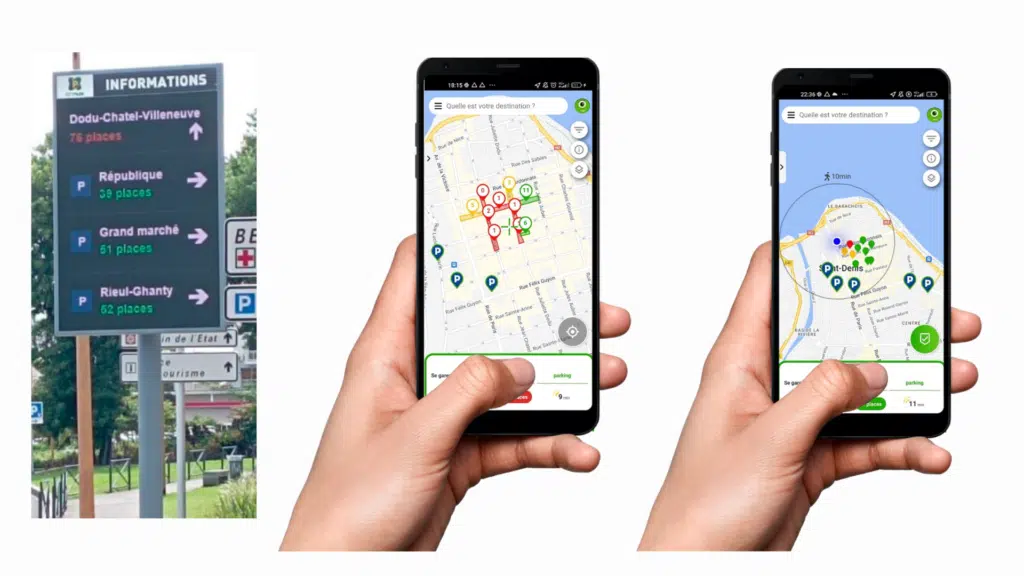
Central purchasing bodies facilitate access to innovative products and new medical technologies. They often have direct links with suppliers of cutting-edge technologies, and can negotiate agreements to introduce these innovations into hospitals.
For example, RESAH recently launched a specific support program for innovative startups for the year 2024. In addition, central purchasing bodies can organize training courses and demonstrations to help healthcare staff adopt and effectively use these new technologies.
Cocoparks, which is listed with UniHA and RESAH, has developed a made-in-France solution 20 to 50 times more efficient than traditional devices for smart hospital parking. The impact: improved QWL, safety and reduced pollution. All without compromising on decarbonization and energy sobriety.
3. Spotlight on the UniHA central purchasing unit
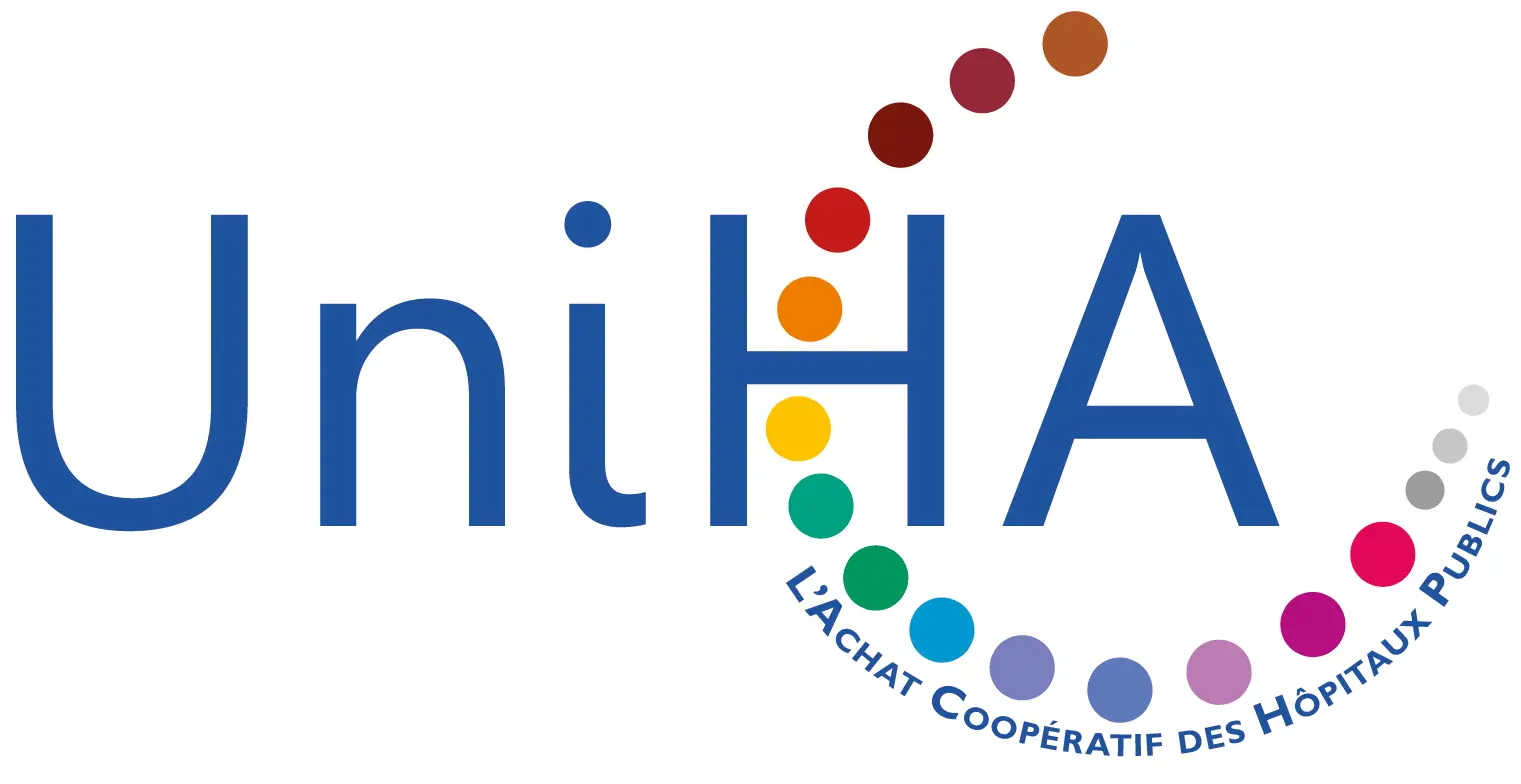
About UniHA
UniHA, Union des Hôpitaux pour les Achats, is a cooperative of French public-sector hospital purchasers, working closely with their supplier companies in an innovative approach to purchasing. It was set up in 2005 by hospital staff (32 CHU and 20 CH). The aim is to pool their purchasing expertise and skills to improve economic performance, time and quality. Joining forces to respond to the profound transformation of our healthcare system. You can find their presentation brochure here. In a few figures in 2024 it’s :
- 1411 establishments including 123 GHT
- 3800 markets
- 6.7 bn perimeter in 2023
- 100 M gains on purchases in 2023
- 1300 suppliers
- 19 coordinations for 16 purchasing channels
Initiatives and Innovations
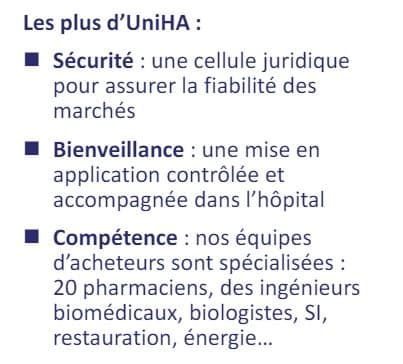
UniHA’s DNA is mobilized in the name of economic performance and accompanies the new challenges of purchasing around decarbonization, security, innovation, attractiveness and health and digital sovereignty.
The Impact of UniHA
Through UniHA, members will have purchased €6.7 billion in purchasing scope by 2023, and €100 million in savings will have been recorded. UniHA is one of Europe’s leading healthcare purchasers, and one of the leading national purchasers across all sectors.
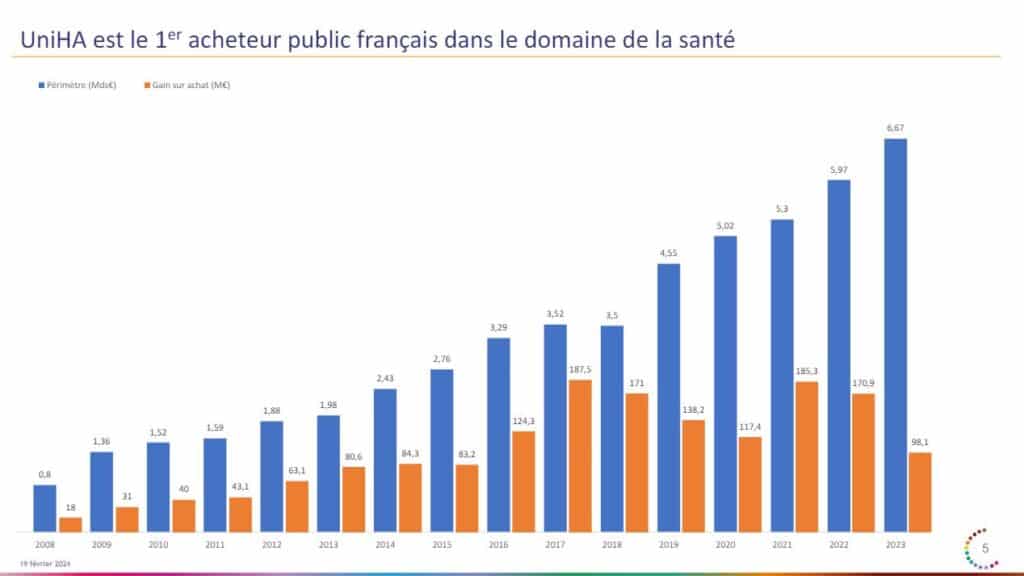
4. Focus on the RESAH purchasing group
Introducing RESAH
RESAH (Réseau des Acheteurs Hospitaliers) is another central purchasing body, pooling purchases for players in the healthcare, medico-social, social, public and private non-profit sectors. Its mission is to improve the economic performance of hospital purchasing. Created in 2007 to support the pooling of hospital purchasing for the Ile-de-France region, RESAH opened up access to its markets to the national territory in 2016, at the request of the DGOS (Direction Générale de l’Offre de Soins). It has thus become one of the sector’s major operators. Here are a few figures:
- 5,700 markets
- 12 purchasing families
- 1000 suppliers
- 2700 beneficiaries
- Market value: 2.8 billion euros in 2023
Initiatives and Innovations
RESAH selects products and suppliers based on quality and performance criteria. It conducts negotiations to obtain advantageous rates. In 2018, it created its center for innovation through purchasing, convinced that the public purchaser is an essential intermediary between the hospital and companies. Among its initiatives and projects, RESAH has also set up a CiDM (medical device innovation center) with Hôpital Foch, with the aim of accelerating access to innovation for patients and healthcare establishments, and supporting industrial partners (startups, VSEs/SMEs, manufacturers) in their medical device development projects.
Impact of RESAH
RESAH plays an important role in optimizing purchasing by member healthcare establishments, generating significant savings on expenditure on medical and pharmaceutical goods. It also promotes access to innovative medicines and medical devices, and secures supplies of critical products. Finally, it also combats counterfeiting and falsified medicines.
Examples of RESAH savings:
- Expensive drugs: -20% on Keytruda (anticancer drug)
- Medical devices : Price cuts of 10% to 30% on orthopedic prostheses, medical equipment and consumables.
- Grouped negotiations: 60 million euros in savings on vaccine purchases by 2022. All in all, RESAH estimates that its actions will enable member healthcare establishments to save several hundred million euros each year.
- In 2022, 124 million euros in purchasing savings were achieved (see below for details by sector).
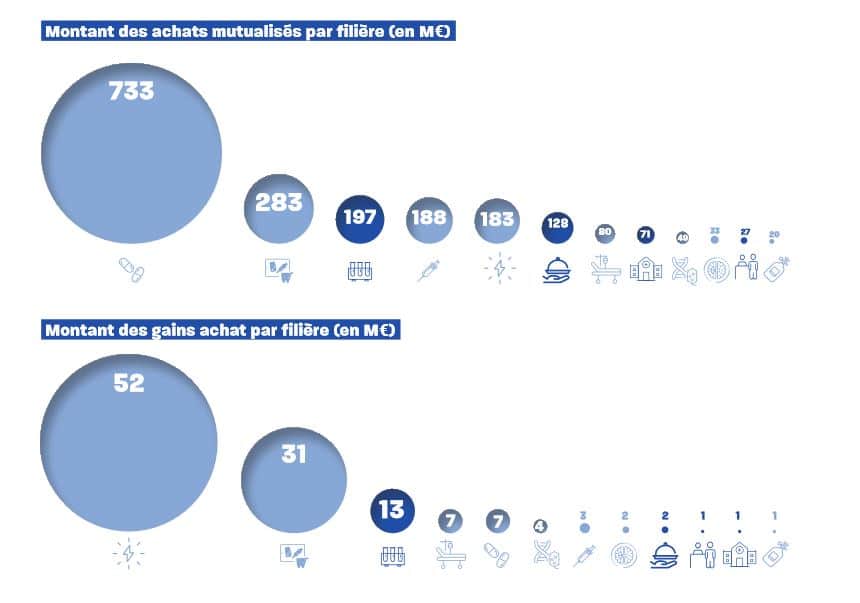
5. Comparison between UniHA and RESAH purchasing groups
What do these two purchasing groups for university hospitals have in common?
UNIHA and RESAH share similar objectives, including reducing costs and improving product quality. Their basic operations and the benefits offered to hospitals are also comparable. The two purchasing groups strive to pool the purchases of healthcare establishments in order to obtain advantageous pricing conditions from suppliers. This pooling generates significant economies of scale and guarantees the supply of quality products for member hospitals.
Differences between UniHA and RESAH
UniHA and RESAH are two major players in hospital purchasing in France, but they differ in terms of structure, governance, scope and approach to purchasing. The first is a cooperative, bringing together over 1,000 public health and medico-social establishments. Its members contribute to and participate in the governance of the structure, thus guiding its strategy. The second is a public interest group (GIP) under the supervision of the French Ministry of Health. Its Board of Directors is made up of representatives of the State and member establishments.
UniHA’s scope of intervention covers a very wide range of purchases, from medical and pharmaceutical goods to works, intellectual services and general services. RESAH specializes in the procurement of medical and pharmaceutical goods, with particular expertise in expensive drugs and medical devices.
Finally, their financing is also different. UniHA operates on a system of membership fees, supplemented by the margin generated on negotiated purchases. RESAH receives a flat-rate contribution from its members to finance its activities.
Synergies and cooperation between UniHA and RESAH

Collaboration between UNIHA and RESAH enables both organizations to benefit from their complementary approaches. For example, they can work together on purchasing pooling projects to maximize savings and guarantee a diversified range of products and services for member hospitals. What’s more, this cooperation fosters the exchange of best practices and know-how between the two organizations, helping to improve the efficiency of hospital purchasing and offer better terms and conditions to member facilities.
During the Covid-19 crisis in 2020, they joined forces to create the Re-Uni consortium for the purchase of personal protective equipment. In 2020, for example, they launched a joint purchasing program for fabric overblouses, with 1 million pieces manufactured. .


